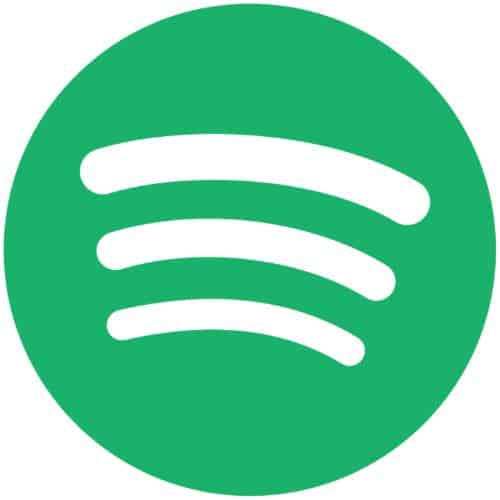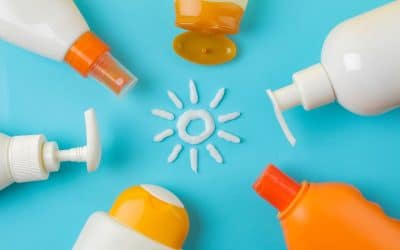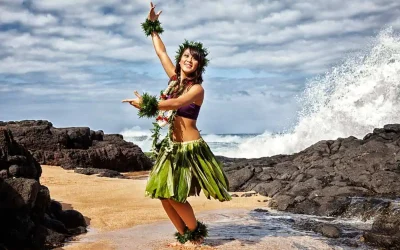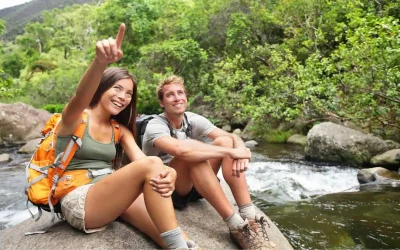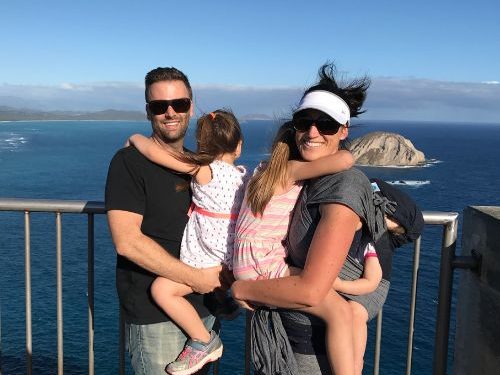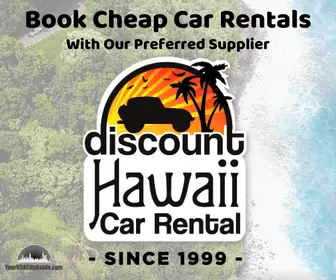Episode 101: Supporting Local Businesses at Made in Hawaii Festival 2023: Part 2
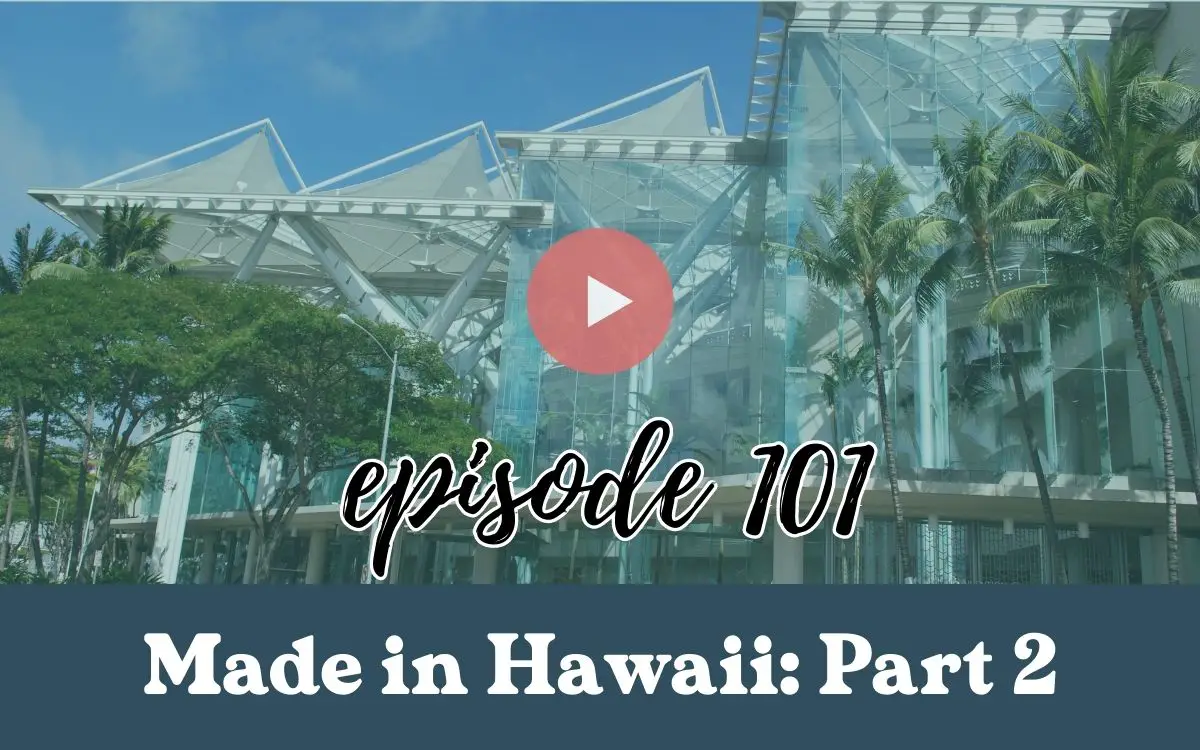
Welcome to Part 2 of our Made in Hawaii series. We’re joined by Paul Rivera, Executive Chef of Hula Girl Waikiki! We dive deep into Hawaii’s rich culinary tapestry, discussing his ascent from a culinary student to a celebrated chef.
Our chat unravels the mysteries of the Hawaiian superfruit, Noni, with Puna Noni. We’ll also welcome local chef and restaurant owner, Keaka Lee from Hapa Hale. And finish on the Big Island with Ahualoa Family Farms.
Planning a trip to Hawaii? Have any questions? Join our Hawaii’s Best Travel Facebook group here now! It’s the perfect place to ask any questions and to be inspired!
This post may contain affiliate links, meaning that I may earn a commission if you use a link provided.
This post gives general info and isn’t legal or authoritative advice. It helps travelers with tips but can’t replace personal abilities, fitness, experience, or local knowledge. Marine activities have risks; assess conditions and follow local laws.
What we discuss within this episode:
Local Chefs
- Insights from Executive Chef Paul Rivera of Hula Girl Waikiki.
- Insights from Hapa Hale’s chef and owner, Keaka Lee.
- Highlighting sustainable culinary practices.
- Collaborations with local farmers for fresh produce.
- Special mention of breadfruit (‘Ulu) in Hawaiian dishes.
- Glimpse into the “Made in Hawaii Festival”.
Puna Noni
- Introduction to the Hawaiian superfruit, Noni.
- Discussion on the health benefits of Noni juice.
- Tips for integrating Noni into daily meals.
Ahualoa Family Farms
- Tour of Ahualoa Family Farms on Hawai’i Island.
- Overview of the Honoka farm, known as the oldest macadamia factory.
Listen On:
Resources
- Made in Hawaii Festival
- Hawaii Community Foundation
- Maui Food Bank
- Lahaina Ohana Venmo Instagram
- Ekolu Lindsey Venmo
- Ekolu Lindsey Episode
-
Patrick Parker Art
- Patrick Parker Episode
Self-Guided Island Tours
- Episode 70 – How to Volunteer in Hawaii
-
Episode 87 – How to Travel Responsibly to Hawaii
-
Episode 35 – 5 Things to Not Do in Hawaii
Travel Pono (responsibly)
Connect With Us
- Buy Me a Coffee
- Send Us a Message with any questions about Hawaii
- Hawaii’s Best Instagram
- Join our Hawaii’s Best Travel Facebook group here now! It’s the perfect place to ask any questions and to be inspired!
Bumper music, Ukulele and Chill, provided by Coby G (used with permission)
Bumper music, Aloha Friday, provided by Clay D (used with permission)
Spread Aloha
- Leave an honest review on Apple Podcasts
- Follow the Show on Apple Podcasts
Related Posts
Top 10 Best Reef Safe Sunscreens for Traveling to Hawaii
[dssb_sharing_button social_network="pinterest" _builder_version="4.24.3" _module_preset="c7f34e9f-6993-48b8-918d-312481fc55be"...
17 Unique Kauai Cultural Activities and Traditions
[dssb_sharing_button social_network="pinterest" sharing_message="custom_message"...
5 Ways to Travel Responsibly to Hawaii: A Guide to Ethical and Sustainable Tourism
[dssb_sharing_button social_network="pinterest" sharing_message="custom_message"...
Hawaii's Best
Announcement
00:03
Aloha. Welcome to Hawaii's Best. Here you'll learn what to know before traveling, as we discover Hawaiian culture, local businesses and the experiences that make Hawaii one of the most incredible places in the world. And now your host, brian Murphy.
Bryan Murphy
Host
00:21
Welcome to part two of our Made in Hawaii series, where we're going to be talking to four more vendors who are going to be at this year's Made in Hawaii, and if you haven't listened to part one, which was released on Wednesday, I'd highly recommend to go back and listen to that. I gave some updates on the Maui fires, the Lahiana tragedy and ways at how you can tangibly help the situation. For this episode, I will also put those same links in the episode description so you can directly go to some of those organizations and consider donating that way. In the weeks to come, I'll be continuing to give you updates about Maui and about travel and what we can expect with that, so stay tuned for that. But on today, we're going to be learning more about ways and how you can support local. If you happen to be on Oahu during this time for Made in Hawaii, you can go to the Honolulu Convention Center this weekend and if you are off island, if you're on the continental US, you can support some of these businesses via their online store. And in that same note, I would also recommend looking into some Maui local businesses who have an online presence. That's another way to help some of those small businesses. So it's important to note that these interviews were recorded over the last few weeks, which means a few of these interviews were recorded before the Maui fires and a few were recorded after. Please know that many of these vendors will be offering ways to support Maui during this year's Made in Hawaii festival and, for example, 10% of all ticket sales will be going to support Maui, along with 100% of the proceeds from the official Made in Hawaii t-shirt will be going to support Maui as well.
02:12
So our first conversation is with Punononi, on the island of Oahu and started by their father, jim, in 1999. Punononi Naturals was it started as just another health business. Jim, a devoted Honolulu firefighter stationed at the North Shore of Oahu, remembered the wisdom of his grandmother, puna. She often spoke about the incredible health benefits of the homemade Noni juice. After a physical exam, jim, inspired by Puna's teachings, decided to give Noni a try, and you'll hear a little bit more about that story from Nakula. Realizing the power of Noni, they not only introduced a line of juice and supplements, but also expanded to a complete Noni body care range. Every product under their brand resonates with the values of being GMO free, vegan, soy and gluten free, cruelty free and environmentally safe. So let's welcome Nakula Nd from Punononi. Thanks so much for joining me today. Tell us a little bit about who you are and a little bit about the company.
Puna Noni
Guest
03:16
My name's Nakula Tibi. My dad started the company. This is my sister-in-law, devaki. He started the company about a little over 20 years ago when he was stationed in the Honolulu Fire Department. During like a routine physical he found that he had high blood pressure and they put him on like the prescription pills and he didn't really like the way it was making him feel. So he remembered that his grandmother used to always give him Noni and say oh, this is good for you. You know it's good for you when you're sick or when this or that. It's kind of like the Keral. So he started trying Noni and in a short time his blood pressure evened out and he was able to get off of the prescription pills. And that is how Punononi was born.
04:06
Him and my mom started with just the juice and capsules and then, when the kids got older, we expanded into like a whole body care line. So we have, like we formulate the shampoos, the conditioners, body wash, lotions, lip bombs, bath salts it's all made here in Hawaii, it's all naturally. You can read all the ingredients. It's very it's all. It's used with Noni, hawaiian Noni.
Bryan Murphy
Host
04:32
You can pronounce all the ingredients.
Puna Noni
Guest
04:33
Right.
Bryan Murphy
Host
04:36
For those who don't know what is Noni so it's like Hawaii's super fruit.
Puna Noni
Guest
04:41
It's known as a stinky fruit too, so you'll see it when it's green on the trees and when it turns like really white and translucent, it starts to get really like hooked and un-gents now. So what you do is you take that and you ferment it so we only pick the right fruit so people will use it for like immune, boosting energy digestion, overall to health.
Puna Noni
Guest
05:06
It's helped a lot more than. Yeah.
Bryan Murphy
Host
05:09
And some of the ways that it can be applied. You mentioned juice pills and also beauty products.
Puna Noni
Guest
05:16
Yes. So, like the Polynesians, they would like put Noni on their skin. Yeah, but not very many people want to walk around smelling like Noni, so we've infused it into our body care, the juice and the oil, and basically you smell good, but you're still getting the benefits of Noni on your skin.
Bryan Murphy
Host
05:35
So someone is curious about maybe trying Noni, maybe for the first time. What product would you recommend or how would you navigate that person?
Puna Noni
Guest
05:45
It all depends. If you are used to drinking a lot of like kombucha and or apple cider vinegar, then Noni can be trashed. Yeah Too bad. Yeah, yeah, it is. It's a fermented drink, you know, so it is very strong. That taste. A lot of people compare it to blue cheese. For some reason it smells like it and it tastes like it. I just got used to the taste, so some people don't get bothered by that, but some people do and you don't mix it Like oh yeah, first time you can mix it with like, try it out with cheese, you'll love it.
Puna Noni
Guest
06:17
You can put it in smoothies. So when we do our shows we often mix it with fruit juice to show people that you're able to get the benefit without the taste. And then you can slowly cut back on the juice and just do more and more Noni once you get used to it yeah.
Puna Noni
Guest
06:35
People who can handle the taste actually just drink the cup, yeah.
Bryan Murphy
Host
06:38
Yeah, I like my kombucha, I like that, I like my apple cider vinegar, so I'm all good.
Puna Noni
Guest
06:45
And we drink from the out of the fridge, so anyone wants to drink more?
Bryan Murphy
Host
06:49
Yeah, love it. Well, this year's, made in Hawaii, is a bit, maybe a bit more special for you guys. You're you're kind of relaunching. Yeah, maybe talk a little story about what has happened and what's led you to where you're at today in Hawaii.
Puna Noni
Guest
07:09
Yeah, none of them without crying. Yeah, I might not. So last March, right are? We had a warehouse here in Kailua for 20 years, yeah, and it all burned down in a few hours. Everything, we, just everything, all our equipment, equipment, yeah, ingredients, everything, bottles, bags, all bags, yeah, thousands and thousands of those are collaboration bags with Wopulut. So that all went?
Puna Noni
Guest
07:38
Oh no, way and everything we built. Like my dad built everything in there. He built the offices the kitchens, the storage room, so it's like everything was gone.
Puna Noni
Guest
07:49
So from from then, you know, of course, she never stopped.
Puna Noni
Guest
07:56
She just missed their family. I mean, I started working for it when I was like 15, you know, and like I mean my kids practically grew up there. It was like a second home, you know. So I didn't want that to be the end, you know, and I wanted, you know, my kids to see that. You know you go through hard times and you don't give up. You know you don't just, oh, this is too hard, I'm going to stop. So, you know, I wanted to show them like life is hard, you got to just keep moving and keep waiting, and so we haven't stopped. And you know we're going to be handmade in Hawaii. We got a new product to launch. So, you know, just got to keep pushing on. It means a lot to us. You know the business. You know my started it. My grandmother in my great grandmother Really cared about Noni. She believed in it. So you know we don't. Yeah, pune was her name. So that's why we come back.
Bryan Murphy
Host
08:50
Cool.
Puna Noni
Guest
08:50
So, yeah, it's special this year, special to us because it's our, it's like a comeback, you know, our first time in the public since the the fire with a new product lined the launch.
Puna Noni
Guest
09:02
It's your way to reinvent yourself, right? It's like oh, it's a new start, we might as well do things better. Let's eliminate this. That's make you know better things work.
Bryan Murphy
Host
09:13
Yeah, so Reinventing, yeah, I wouldn't know me, so maybe take me back to after the fire, the aftermath of the fire and just assessing the damage, and then People are wanting their noni. Still, what was the community response around the aftermath of the fire?
Puna Noni
Guest
09:31
Well, the immediate response was people going into the stores like down to earth and hoarding all our noni juice.
Puna Noni
Guest
09:39
And I'm very thinking that we never get it again.
Puna Noni
Guest
09:41
I want to run out. So the store you know the employees down to earth or who puts we're telling us we're completely out because people just hoarded. So that was the immediate response. But Besides that, you know, like we were talking about a while ago, you asked about supporting local and this this is what it's about. Supporting local is, right after the fire, somebody made one of her friends made a what do you call that go fund me and people just started. People were actually already look before we had to go fund me. People were actually asking us when is the go fund me page? I want to donate? And Just people just started Sending us.
Puna Noni
Guest
10:21
Yeah, the outpour of the community. I mean, that was also one of the reasons we just kept going, you know, because it's like they gave us the strength. You know they're like you guys. This things happen and you guys can. We know we have faith in you guys, you're family, we love you guys and you know, we know you're strong and you can, you can fight through this and so, and then, why we did not their local businesses Like vermilie for a million. A lot of what people were doing like fun.
Puna Noni
Guest
10:47
She was. She's it like a whole sale of her clothing and to raise money For punanoni and then our local pretao zero waste, our zero waste store here refills store here in Kailua she made a bull is during her third year anniversary for her store. She did a silent option for what I made and she raised Thousands of dollars. Yeah, just to give to us.
11:13
Yeah, and then her mom. So Laurie is the owner of pretao and her mom matched the all the options. Yeah, it is so we are just. Every time People do that for us, it's just, you know, we cry and it touches our hearts and it's just yeah this is, this is, this is Hawaii.
Puna Noni
Guest
11:38
How are you? You know, you know they'll love a spirit. You try to help each other when you're and especially like local businesses.
Puna Noni
Guest
11:45
They know how hard. They know how hard it is. You know the struggle on a small business and so they feel here on. I think business, small business owners Understand each other. Yeah, we yeah the struggles.
Bryan Murphy
Host
12:00
Resilience, that does the word as you're talking. Resilience, thinking about the aloha spirit and especially with your family, having that responsibility and just feeling that those who come before you to carry that on. I think, even more so With what you guys are doing now and kind of this you know, relaunching if you will. You keep talking, keep hanging about these new product launches. So what's what's going on with that?
Puna Noni
Guest
12:27
So we have like our, it's gonna be a new coffee line. Okay, a lot of our customers for quite some years now have been asking us oh, do you have a coffee? And we never did so. Now we're like, okay, here's a finally here, there's a good time to do that.
Puna Noni
Guest
12:41
Yeah, so for four years people have, I think, the pecan line right, pecan, you just, yeah, very, very popular sense here in Hawaii and a lot of people. Every time we're in made in Hawaii, every time I do Demo's, everybody always asks for a copy and we always say, oh Sorry, no, we don't have that. So finally now, like I said, you know, reinventing ourselves, we are gonna take off some of the products that weren't selling that, yeah, slow sellers, and just concentrate, you know, our best sellers and then finally Giving our customers what they want, which is a pre-coffee line. So it comes in shampoo, conditioner, body wash and no Eventually foaming hands.
Bryan Murphy
Host
13:27
So, yeah, and will this only be available at main in Hawaii, or will it be available online Eventually?
Puna Noni
Guest
13:33
so, yeah, I'll be available online as well. We'll be kind of launching it online during made in Hawaii, okay so this is tomorrow like a big lawn, yeah, and Other with that.
Puna Noni
Guest
13:44
So that's why we wanted it to be a bigger launch. We're doing giveaways to go with it. We are gonna give free gifts if people buy the line of pick up you can made in Hawaii and Same online. For our online customers who can't come to Hawaii, that will bring me then, you know, made in Hawaii festival to them online by giving them the same kind of deals, free gifts and special Collaborations with other local okay, local friends We've been doing, yeah, oh cool.
Bryan Murphy
Host
14:14
So if someone is coming to Oahu, for example, but not for me in Hawaii, may they're coming, you know, a couple months from now, what stores would you recommend? They? They can find, you guys, in.
Puna Noni
Guest
14:26
So we're in Whole Foods, down to earth food lands. The Pukaki line probably won't be in whole foods at that time, so it takes a little longer. So if they're wanting like the whole line, let's say down to earth and it's a gland.
Bryan Murphy
Host
14:42
Okay, so what else can we look forward to for this year's main in Hawaii, with what you guys have going on?
Puna Noni
Guest
14:47
So for the show will be offering all of our products at 30% off. So for those who like really enjoy our products, or just hear about it and want to give it a try, the main in Hawaii event is the place to do it, because you'll get it very good price.
Puna Noni
Guest
15:04
Time to stop. Yeah, I will be there from August 18, 19 and is wedding.
Bryan Murphy
Host
15:09
Our boost number is 1705 okay, thank you so much for your time and. Yeah you know where can people find you? So if they're not coming to main Hawaii, where? Where can people find and and go to your store?
Puna Noni
Guest
15:25
Well, they can shop online, so our web website is wwwpunanonicom. They've confined us, our social media, locally. We're in like food lands, down to earth, whole Foods in all the islands, little boutique boutique, yeah, yeah, so you know we're in the local shops here. We're also there. Yeah thank you, yeah, thank you for having us on here. No, absolutely for supporting local as things.
Bryan Murphy
Host
16:04
As I mentioned in the previous episode and part one of this main in Hawaii series, me and Hawaii isn't just about vendors. It's also about highlighting local chefs and also artists. Up next we have hula girl Waikiki's executive chef, paul Rivera, to talk a little bit about what he has planned for this made in Hawaii. Well I, chef, thank you so much for your time and coming on. Maybe give us a just a brief overview of what you're gonna be doing at this year's festival at the convention center.
Chef Paul Rivera, Hula Grill
Guest
16:33
My event will be on Saturday and on the 19th It'll be at 10 am, I think it is, and I will be talking about our ahi fish and then also three Sustainable starches that we have on the island. We're making ahi Saviche and we're making three types of chip with taro, sweet potato and oolu. And I'll be specifically focusing on oolu because a lot of people don't know what it is, and I'll talk about the different stages and how they can prepare it, from Appetizer to starch, salad to desserts. You know, put the plate together at the end.
Bryan Murphy
Host
17:09
That's awesome, maybe if you can give us a sneak peek and just talk a little bit about what oolu is. A little bit for those Maybe, who aren't gonna be there.
Chef Paul Rivera, Hula Grill
Guest
17:17
It's becoming popular now and it's a breadfruit very popular in the Pacific region and what what it is is? It's a Plant that's very sustainable. It grows perfectly in this climate and when it's ready to harvest, you can take it kind of like in its raw stage and you kind of peel out the skin and you can fry it to make like chips, like Oulu chips Thank you for watching and then, as it gets riper, the skin starts turning black dots and you can use it for like starch A lot of people steam it with coconut milk or you can make it for actually like bread, like lyrid breadfruit, and some people actually make dessert out of it. So I'll be focusing on this batch with the frying the chips, because that's a lot easier for people to use it on their first hand basis. With Oulu. It's a lot user friendly and easy to do.
Bryan Murphy
Host
18:12
Now, how long have you been with HuluGro?
Chef Paul Rivera, Hula Grill
Guest
18:15
TS, our parent company, and HuluGro, which is also related to Duke's Waikiki and Kyo Kisleilani, but HuluGro, waikiki I've been bouncing back and forth since 2006.
Bryan Murphy
Host
18:28
Okay, and maybe for those who don't know what an executive chef is, maybe he can give us a little overview of what your role is.
Chef Paul Rivera, Hula Grill
Guest
18:36
Has a lot to do with as far as the financial obligations, as far as not just working with food. But I have my sous chefs and my color team leaders that I work with and they work on their daily specials and operations. But an executive chef deals with a lot of the planning of the menu, the PNLs working with developing the restaurant, developing managers, all that kind of stuff, the long term goals, and I do a lot with that. And just a perfect example we work with two high schools, which is Castle High School and Roosevelt. We work with the internship program and I'm able to mentor the students to get them prepared for the next level once they graduate.
Bryan Murphy
Host
19:19
Gotcha that's cool, I would assume, in all your tasks, and then trying to balance that with creating dishes. So, with all that, what drives your creativity as a chef?
Chef Paul Rivera, Hula Grill
Guest
19:34
I think a lot of each chef is different, but for me it was growing up locally and seeing my Korean friends, my Samoan friends and going to my Filipino parties and seeing different cultures, how they cook and growing up I wasn't exposed to the French cuisine until I went to culinary school. So then opened a whole big venue for me and as I grew up in the industry I was fortunate enough to be surrounded with a lot of the professionals, so they took me under their wing and getting to do the apprenticeship program and culinary program and also, being an ex-veteran, they paid for my culinary school so that helped me get to where I am today. But the most part is basically having the passion and enjoying what you're doing and I kind of look at it like a construction worker. They build things, but the only thing that people destroy it with their appetite and have to redo it again.
20:37
So that's the thing I enjoy, and also teaching, yeah.
Bryan Murphy
Host
20:41
That's an interesting analogy, yeah. So, speaking of that, what are some of your well, two-part question, what are some of your favorite dishes to make, and then what about to eat?
Chef Paul Rivera, Hula Grill
Guest
20:51
One of my favorite dishes to make is always seeing what is available. So we work with our farmers and our vendors to see what they have and then we create those things, that we work in partnership with my sous chefs and my culinary team leaders and we develop flavor profiles and all these things and we kind of do a test and actually make it. So in our restaurant we always do every month we do a breakfast special, lunch special and then for dinner we do a nightly special which we kind of run at the most two nights and then we rotate. We do like two fish specials or a protein special. So our restaurant is lucky because we get to play around with food, not be stuck on a set menu.
Bryan Murphy
Host
21:35
And then kind of going back to me, and in Hawaii festival, why is participating in that important? Maybe for you and for the restaurant?
Chef Paul Rivera, Hula Grill
Guest
21:44
At HulaGuru we believe in taking care of our land and utilizing what we have and working with our local vendors, because obviously spending money having them coming in costs money for gas and all that. So working with our smaller farmers, we can tell them what we need or what they grow and we actually use what they give us. So that's why our menu always rotates. But the main thing is that we always try and help our vendors. We try and look what's available, what's in season, and a perfect example is our fish. If we went strictly with slappers, we deplete the fish. So we kind of like go with what's season. When summertime is swords running, we run sword and then when they catch by catch, we run either Manchong or Opa but we still use pee. But obviously there's a certain amount of pollen we get. So we do different grades so we keep it sustainable.
Bryan Murphy
Host
22:43
You mentioned a little bit about working with local vendors and maybe expand if you can expand on that a little bit just maybe more generalized terms what does supporting local mean to you?
Chef Paul Rivera, Hula Grill
Guest
22:56
Local is giving the small mom and pop farmers shops a chance to make a living, and we reached out to different vendors and you know, perfect example is one of our. During COVID, one of the staff at Duke's got a grant and he wanted to farm and we worked with him to see what he can grow, what works and what we want and he can provide. So every couple of weeks he would give us stuff, what he has, whether it be beans, cilantro, tomatoes, whatever it is, we buy from him. And we work with different farmers because we want to make sure that we take care of them. And the perfect example is the one that and do the taro and the loy farm. We buy from them. We actually have our staff go every quarter and work the land, pull the weeds, plant harvest. Yeah, in fact, we just did it, like two weeks ago, in one of the loy farms in Kailua Awesome.
Bryan Murphy
Host
23:57
And with the location of Hulu Grill and if you give us just a brief like it where's Hulu Grill located? And then, if someone's coming, I'm sure you guys get a lot of first time people visiting Hulu Grill on a daily basis, but what would you recommend for those first time customers?
Chef Paul Rivera, Hula Grill
Guest
24:15
Mention that because a lot of the tourists don't realize that Hulu Grill is actually above of Duke's Wikey Key, and Duke's Wikey Key is an icon. Everyone goes there for their Mai Thais and their Hulu Pies. So if you wanted to step it up a little bit and come upstairs to Hulu Grill, we do everything to order, we make everything from scratch and you actually have a better view because you're on the second floor and you can see diamond head to your left, you see the waves and people walking around on the beach, and then you actually get good service and good food, because TS believes in having a friendly operation. So we do a lot to take care of our guests and when they come up here there's a lot of things they can get. Whether it's fish, chicken, beef, vegetarian, we take care of all of them.
Bryan Murphy
Host
25:06
Awesome. Well, I appreciate your time and thank you for participating in this year's Maitana Hawaii Festival. Anything else you'd like to leave our listeners today?
Chef Paul Rivera, Hula Grill
Guest
25:16
Check us out on Saturday, the 19th, at 10 am. I'll make planning samples for you guys and I'll make it easy so you can make it at home. Thank you so much, all right.
Bryan Murphy
Host
25:26
Coming up. Next we have Ahua Loa Family Farms, so we're going to journey over to the big island of Hawaii, off the Hamakua coast, where we'll find one of the best macadamia, nuts and coffee farms in all of Hawaii. So let's welcome the person who oversees this operation, chad, to the show. Tell me a little bit about the family farm and how it all started.
Ahualoa Family Farms
Guest
25:50
Farming into my blood. I was actually born and raised in Southern California on a citrus ranch. Oly's loved being outdoors growing things, farming, ever since I was an infant. Following my dad around A few years back we were looking for new opportunities on the big island and we came across a couple that were selling their small, really small, value-added macadamia nut business. They had retired to the big island, had a few trees in the backyard. They would harvest crack slavery the nuts, roast them, sell them to friends. We came a huge hit, started doing farmer's markets. Came a huge hit. Resorted one of their products. Now they had to have a certified kitchen, adult kitchen, expanded and realized they're supposed to be retired and they're doing seven days a week.
26:37
You know 12-hour days having your own small business and realized that they needed someone else to take over the reins of the business. And we were really just in the right place at the right time. I wasn't interested in mac-nuts or coffee, because everyone knows mac-nuts and coffee from Hawaii. I want to do something with some more exotic, exotic fruits. But we met, you know, never passed up any opportunities. We met and hit it off. It was her baby. She approved, allowed us to adopt it and take over and the rest is kind of history. So that's kind of how it got started. And now we kind of just fumbled into the situation where it's this real guy you know, we know all about your Oana kind of we are at, you know, the right place at the right time and it all just kind of, you know, organically worked.
Bryan Murphy
Host
27:29
So what are some of the similarities and differences from you know, growing up harvesting citrus and now harvesting growing and harvesting coffee and macadamia nuts.
Ahualoa Family Farms
Guest
27:41
Yes, I mean the basics of farming pretty much are the same, no matter where you are, as far as you know how, how plants grows, how tree grows, but it's where you are. Each cell reason, region is very different. I mean, even from Kona to Pama Kura, where we are, there's different practices, your weather's different, soil is different, terrain's different. That all changes how you do things. That's what makes agriculture so unique. You can know how to grow coffee and Kona, but you thrive 45 minutes the other side and it could be a completely different set of practices, and that's also the challenge, and every year is different.
28:19
So I think, just overall, having experience of learning how to deal with what you're given, trying to prevent issues and adapting adaptation is the most important Always progressing, trying new things, you know, thinking outside the box and kind of learning from your experiences as well as a big part of it. So the overall scope of it is similar but at the same time very, very different. You know, the island is just the climate, the soils, the terrain, so many different kinds of factors that you know are different than, say, california. That, yeah, that come into play.
Bryan Murphy
Host
28:57
Sure. So if someone is, you know, visiting Hawaii Island in particular, and maybe they're finding themselves on on Hilo side, where you guys are, how can people find you and what can people expect as far as like a visit? Sure, sure.
Ahualoa Family Farms
Guest
29:14
So we're on the Hilo side, north Hilo, about 45 minutes on a beautiful Hamakua coast. So we're on the wet side, beautiful country. We have really deep volcanic soils, we get ample rainfall, so all everything we grow is happy. I mean, obviously we get droughts and you know, all kinds of things happen, but it's a variable, very comfortable place to live for us, humans and plants alike. So we're located in Honoka, down, just that historic old sugar town, very close to Waikio Valley Lookout.
29:46
We just recently, last few years, have restored and redilitated Hawaii's oldest macadamia factory, so we're very, very proud of that. So we are now cracking and processing in Hawaii's oldest and now newest mac and factory. So it's an oldest store of filming. That's cool. That was just dilapidated, falling, rotten away. That we saved, fell in love with, and we now crack and process everything in-house. So that's just, you know.
30:15
Further was another piece to our puzzle. We support and find nuts from over 60 different growers in our area. They all bring us their nuts during harvest season it was just ticking off and we process, cracked everything fresh and they go up into our certified kitchen, which is right on Main Street in town, the Main Street in town, where we also have our retail shop where we sell everything, come, sample, taste it, smell what we took in that day, enjoy a cup of coffee, our lani. So those are our locations and our farm is very, very near to that as well. But yeah, we're in Honoka town where we basically do everything in-house and that's kind of our claim to saying what sets us apart, why our mac nuts and coffee are the best on this planet, is we do everything in small batches.
31:03
It's Cormay. We do it all by hand. Like our lily-cloid flavor. We grow our lily-cloid, we juice it. Malianian and garlic flavor in that nuts. We ship over Malianians and we juice those. Everything's natural. All the ingredients we source local if it's made or grown local, and they're all made in small batches. We roast them by hand once they can shoot at a time, and the quality, flavor, taste, appearance it all shows and everyone who's doing this putting their heart and soul into it, because we all love what we do. And that's really what sets us apart, why ours are the best, because of those, that small batch Cormay and a quick turnaround. We're not mass producing, throwing them in a warehouse for months at a time. They're within a week, literally. If you place order with us. Buy them. They're no more than two weeks old.
Bryan Murphy
Host
31:52
So why do you say that? I mean, there's so many great products across, especially Hawaii Island, big Island and coffee and McNuts. So what sets you guys apart a little bit? Maybe expand on that a little bit more.
Ahualoa Family Farms
Guest
32:06
Yeah, so that has to be our mission. Our tagline, or the three words you'll see on our products, on our shirts, is what we live by, and I'm sure all of you do, and that's Aloha, aina, ohana, and kind of what those three words mean to us and you know, come through in what we do, what we grow, what we make. You know, aloha is more than a word, it's a way of life, it's about having a, you know, humble heart. Respect for all is just.
32:36
There's so many Amazing positive definitions of aloha, you know, caring and respecting the Aina. Obviously, we have nothing without it and we have nothing without it for we have to protect it for generations to come. So we having a deep respect and and Gratitude for what we are given, you know the bounty that it provides. And then, last but not least, is ohana, you know, having a appreciation for our, our friends, our family, our team, our customers are our farmers. We are all community, all ohana, and that is, you know, one of the most important things that we all need to, you know, stick together and Need that, since community and respect for where we are and what we've all been been blessed with. But, um, those three words Aloha, aina Ohana, you know, mean everything to us and it's what we live and what our business operates office.
Bryan Murphy
Host
33:29
That's cool, so I mean. So, in addition to the storefront, where else can people find and purchase your products?
Ahualoa Family Farms
Guest
33:35
Yeah, so we have. We partner with various retailers on all the islands, from, you know, gift shop set resorts, the airports carry KTA Whole Foods and, of course, most importantly, all your, your small, local businesses. We have a you know handful of your different your small boutiques or grocery stores, smaller markets, our nuts as well. We do a handful of farmers markets on the big island, on a lot who. We do the KCC farmers market and we have various people on all islands to sell our products and, of course, online you can buy everything direct from us all. Online you can also learn a lot more about us, what we do, how we do it online as well.
Bryan Murphy
Host
34:18
Yeah, and what's the?
Ahualoa Family Farms
Guest
34:18
website. It's a Hula family farms dot-tons.
Bryan Murphy
Host
34:23
That's easy, Okay cool and then, specifically, we're. The reason for this is we're talking about made in Hawaii. Why is that important, on top of everything else that you guys are doing to participate in that?
Ahualoa Family Farms
Guest
34:34
Yeah, so made in Hawaii's our biggest and most exciting event of the year. I mean, we plan a year in advance, or at least we start counting down. The biggest part is it's Supporting local, which is more than ever, you know, extremely, extremely important. It's all supporting locally made, grown, crafted in Hawaii, and that's that's very important to us, that's our, our mission, and it's very important to all the islands, to to everyone. So we love that there's one venue that can showcase and allow all these small business, which small businesses are so important to our community and economy, and this is a great platform for Everyone, big and small, to get out, show what you, they can grow.
35:20
What I love doing is just meagling with customers and talking story and and it's just getting the feedback and Realizing we're all one big ohana as well with the vendors. We just we have so many new friends every year, but it's such a great event that showcases the local talent which you know needs to be lifted up and be, you know, leading our, our Communities. So it's not such a great event, or we look forward to it every year to just expanding our ohana and Teaching people about you know what we do, why we do it, how we do it and, obviously, facing it. And now which they can, you know, vouch for our, our passion and what we do working.
Bryan Murphy
Host
36:00
People find your booth this year.
Ahualoa Family Farms
Guest
36:01
Yeah you can find us at booth 1328. We are a corner booth this year so it should be fairly easy to see us. So nice. We will be there working, working shifts, but we will be there. Please come and say hi, we'll leave it out. Some video going, we can kind of show some video tours of our farm and our, our factory and all that good stuff. But we'll of course have free samples all our product. We always love, love, you know, seeing all of you and talking all great.
Bryan Murphy
Host
36:29
Chad. Thank you so much for your time. I know problems. Thank you very much. All right, last but not least, we have chef kakali from kapa hale. Kapa hale, located on the east side of the island of Oahu, it's a brilliant tapestry of Hawaii regional cuisine modernized for today's palette With the deep respect for local products, the intertwined ethnic influences, crafting a culinary narrative found only in Hawaii, drawing inspiration from Hawaiian, american, european and Asian flavors. Kapa hale doesn't just serve dishes. They tell the tales of local farmers and the vibrancy of the islands. Chef kaka, alongside his team, have birth a menu that is innovative, with unique flavors and creativity. So let's welcome chef kaka to the show. I Love to hear just a little bit about how you got into the culinary arts and Eventually come to open up your own restaurant.
Chef Keaka Lee, Kapa Hale
Guest
37:30
Basically I was like any other typical college kid, jumping from major to major, was Trying to be Something in the medical field, but never really found a niche for it. The industry and the places that would hire a college student with no experience was the food industry. Not necessarily the entry-level position, but more so that was able to fit my college sketch. But my mom was Unknowingly training me when I was a kid. I used to be one of the pickiest eaters in the world. I wouldn't touch anything green. Wait, are you? Are you a middle child? I'm actually the eldest of okay, gotcha, so the child. My mom used to tell me, when I was probably around intermediate, that if I didn't like was on a table, I had to cook my own food. Now it wasn't anything gourmet, it was just, you know, cup noodle, bowl of ramen, maybe like a cream of mushroom soup, but um, yeah, anything and anything at the table that didn't like that I, my mom, would refer me to make my own dinner.
38:43
Long story short, there is a college up the road from where I live, kcc. They had a culinary program. I've been to about three or four different restaurants while going to college. They kind of pulled me in, took a few college classes for a KCC, for culinary. Yeah, I just kind of pulled me in. I was very interested in the sciences there, like nutrition, and then cooking in a way became my new sport Love playing sports growing up in high school and that there is a lot of cooking competitions so I pushed myself to get better every day and Next thing, you know, I just felt that I was meant to do something in in this culinary world.
Bryan Murphy
Host
39:28
That's incredible, I mean it's. It's one thing to kind of reach that goal as a, as a chef, at the level that you are, but then to open up and start a restaurant, that's a whole other venture. What was that like?
Chef Keaka Lee, Kapa Hale
Guest
39:41
I got to work at tea top chefs here in Hawaii, like Alan Wong and Russell Sue. I saw myself craving to learn more, so I went to San Francisco Try to see if that was going to be something I'm interested in, ended up moving to another expensive city called New York. I in New York, just kind of being more like a sponge, just wanted to learn as much as I can. And you know, the goal was always to come back home to Hawaii and try to make something out of myself to provide for my family. And you know, honestly, one too many blizzards blew me back to Hawaii. That's a good analogy I made. I made my a deal with my wife that if she found the job, we moved back home that summer. I, sure enough, she found a job the next day. Then I finally had an opportunity to open up Kappa Holly.
Bryan Murphy
Host
40:33
And what is it like being one, being the chef and also being the business owner? How do you?
Chef Keaka Lee, Kapa Hale
Guest
40:38
balance that Spin it and spin hard. For me, it's finding balance and time with my wife and my daughter. My daughter is three and a half right now. She is help, pushes me through, get through today. So our restaurant opened our doors in December 2020. Been a different time, since. One thing that's taught me about the pandemic was we stay vigilant. We try to adapt as much as possible, but knowing that I'm providing a future for my daughter pushes me to come to work every single day. So Kappa Holly will open up every day for dinner. We do lunches from Wednesday through Friday and we do brunch on Saturday and Sunday, so you'll have a good chance of seeing me at the restaurant for sure.
Bryan Murphy
Host
41:27
So now that things kind of on the other side of the pandemic and a little bit back to normalcy, how has business been? How has the restaurant been you?
Chef Keaka Lee, Kapa Hale
Guest
41:38
know, honestly, it still has been up and down. You know whether it's staffy throughout the whole process of only two and a half years, a big open. You know, we went through switching over from a plastic bag Ben, which I 100% support, but costs of paper bags, and because we opened up December 2020, I didn't realize how much I had to make my menu revolve around takeout, because when the first day that we did that, we opened, I seen realize that my food didn't look as pretty in a brown square box versus on a plate where chefs can use our creative minds to make something very beautiful, not only delicious and stuff. But yeah, so we had to definitely put our minds together to make sure that we're still giving the same part of the experience, so as if you were to be dining in.
42:42
But you know, I think that you know we're, I think, our industry alone. They were in it together. You know we're all going through the same problems. It's like sometimes we jump on a chef chat and we notice that will all short stuff and we're all wondering why Monday is busier than Saturday and Sunday, you know, and why the cancellation problems keep happening. So that's part of our community here at Goy. It makes us so special. You know we're in it together. We know we need to support one another for sure.
Bryan Murphy
Host
43:22
So, speaking as a you, as a chef, I mean and creating are you constantly creating new dishes and, if so, what kind of drives that creativity for yourself?
Chef Keaka Lee, Kapa Hale
Guest
43:32
Yeah, we love to have fun with the food. The unsung heroes are like the farmers and the ranchers, or, even though we put the name on the menu and get out, the guests don't even have a chance to meet them or greet them and understand their stories. So what's special about couple holidays? We help drive that story and tell that and share that with the guests. To feel like a holiday is a nice vehicle to in a way share the farmer's story because, you know, I connect with one of the farmers her name is Shin Oal from Bull Farms and we talk about the struggles that they have. But that's why we try our best to support as much local as possible, to support our community, to support Hawaii in general.
Bryan Murphy
Host
44:25
Do you have any favorite dishes to make or, maybe, more importantly, favorite dishes to eat?
Chef Keaka Lee, Kapa Hale
Guest
44:31
You know I love my chicken. I love me some chicken fried, braised. The best chicken that I help to offer is actually something we put on the menu right now. We're using J Ludovico form and we split the chicken. We call it a spatchcock. What that does? It helps cook the chicken nice and even so, we take the kill bone out, the backbone out, we spread it so it roasts evenly and it's super juicy and super moist and it's a fun way to share a nice roasted chicken with our customers.
Bryan Murphy
Host
45:11
Maybe you can paint us a picture, a little bit, about where you guys are located and how to find you guys online and on the map.
Chef Keaka Lee, Kapa Hale
Guest
45:20
Of course. So we're located in East Hawaii. We're near Kahala Mall. Our address actually tells the name of the restaurant. We're located on Kilauea Avenue and Pahoa Avenue, so if you put K and P from both of them spells Kappa. We're also next to the US Post Office in Kahala, but more so we're just a small community restaurant just outside of the mall, on the corner of Kilauea and Kahala Avenue. You can sign more information at wwwkappahollycom. Gotcha.
Bryan Murphy
Host
46:00
Now specifically about Maine and Hawaii. You'll be there. Can you share a little bit about what you have planned and maybe about if people are on Island and maybe a lot of people who are tuning in do happen to listen in Honolulu. Maybe you could talk about when you're going to be there as well.
Chef Keaka Lee, Kapa Hale
Guest
46:18
Yeah, so we're going to be there. On August 20th at 10am I'm going to be doing a demo at the Kauvachi Center. It's going to be super fun. For me, when I was a kid, this was almost like tradition. We would always go to the Maine and Hawaii Festival because we know that this is the people of Hibani, sharing new products, old products, traditions, recipes. So it was always something I look forward to when I was a kid. So it's definitely a must, whether you're a local visitor or maybe you tried to go a couple years ago. The fun part about this event is it's always different. There's always new vendors, there's new ideas, there's new chefs demoing. So on Sunday, august 20th, we'll be doing a demo on a simple lemon herb in which you can share with your family. You can have cakes, pies, cookies, or you can just grab a nice spoon and have a lemon curd. Bite it by the spoon.
Bryan Murphy
Host
47:23
Chef Kayaka, thank you so much for your time and for coming on today, hey thank you so much for having me and, hey, I hope to see everyone there. I just want to thank everyone who has come on these last two episodes for their time and for their creativity and for giving so much back to Hawaii. To find more info about the guests on our show today, you can go to the episode show notes or go to Hawaii's best travel dot com slash episode 101. All right, and until next time, be well Aloha.
Hawaii's Best
Announcement
48:00
Mahalo for listening to this episode of Hawaii's Best. To stay up to date on future episodes, please subscribe and visit us at Hawaii's best travel dot com.
Sign up to receive email updates
Enter your name and email address below and I'll send you periodic updates about the podcast.
Bryan Murphy is the owner of Hawaii’s Best Travel and is a recognized authority on responsible travel to Hawaii. Combining years of on-ground experience with insights from the top-rated podcast, Hawaii’s Best, he connects with a broad online community, offering a richer, more responsible way to experience Hawaii.


